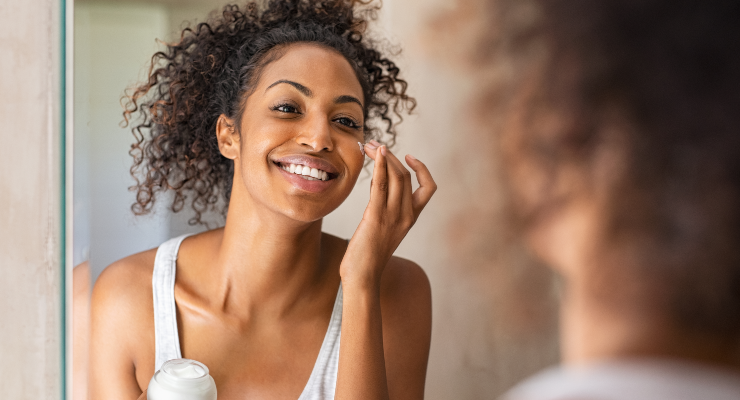Charles Sternberg, Assistant Editor05.18.21
According to The NPD Group, prestige skincare sales in the UK declined 23% in 2020 as consumers began to adopt the “Skinimalism” trend. The total prestige skincare market was valued at £295 million ($418.5 million) in 2020, a year when brick and mortar stores were periodically closed, and consumers changed many of their traditional at-home beauty routines.
The Skinimalism trend features a pared down skincare and make-up routine which adopts a minimalist, back-to-basics approach, according to Pinterest’s 2021 Trend Predictions Report. NPD’s research suggests that UK consumers appear to have embraced this attitude in their skincare buying habits.
Three skincare subsegments demonstrated this in 2020 reporting a decline in sales less than the total category. Sales of prestige face cream declined 20%, prestige face cleansers declined 17% and facial exfoliators declined 3%.
Emma Fishwick, account manager, NPD UK Beauty explained, “Face cream, facial cleanser and facial exfoliators are the three sub-segments where consumers have gone back to basics whilst some ‘additional steps’ such as eye treatments and masks have declined in importance in face skincare as consumers have ‘skinimized’ what products they’re using.”
Shifting Skincare Priorities
Sales of eye treatment products have previously (in 2018 and 2019) represented the third largest subsegment (in value) within prestige skincare, however, in 2020 facial cleansers reported more value sales than eye treatments, reinforcing the trend for a pared down skincare regime. Sales of anti-acne serums increased by 51% in value in 2020 as mask wearing created new needs and consumers focused on skin specific remedies to reveal their glowing skin.
Fishwick explained, “As the pandemic hit, our skincare routine remained consistent when the country went into lockdown. However, consumer confidence has been hit, and people are more reluctant to spend. At the same time consumers focus sustainability also means that Skinimalism has become very topical. Beauty buyers seem to be purchasing less products, and the products that they are opting for are more targeted.”
She continued, “We have also seen an increase in beauty brands concentrating their messaging on the active ingredients in their products. Just some examples of brands that we have observed doing this include Estee Lauder with its latest Advanced Night Repair Serum re-launch, Origins New Multi-powered Youth Serum and in Makeup, Charlotte Tilbury’s new Lip Launch called Hyaluronic Happikiss.”
More Consumer Behavior Analysis
Read Larissa Jensen’s optimistic outlook on how the prestige beauty industry looks different in 2021.
The Skinimalism trend features a pared down skincare and make-up routine which adopts a minimalist, back-to-basics approach, according to Pinterest’s 2021 Trend Predictions Report. NPD’s research suggests that UK consumers appear to have embraced this attitude in their skincare buying habits.
Three skincare subsegments demonstrated this in 2020 reporting a decline in sales less than the total category. Sales of prestige face cream declined 20%, prestige face cleansers declined 17% and facial exfoliators declined 3%.
Emma Fishwick, account manager, NPD UK Beauty explained, “Face cream, facial cleanser and facial exfoliators are the three sub-segments where consumers have gone back to basics whilst some ‘additional steps’ such as eye treatments and masks have declined in importance in face skincare as consumers have ‘skinimized’ what products they’re using.”
Shifting Skincare Priorities
Sales of eye treatment products have previously (in 2018 and 2019) represented the third largest subsegment (in value) within prestige skincare, however, in 2020 facial cleansers reported more value sales than eye treatments, reinforcing the trend for a pared down skincare regime. Sales of anti-acne serums increased by 51% in value in 2020 as mask wearing created new needs and consumers focused on skin specific remedies to reveal their glowing skin.
Fishwick explained, “As the pandemic hit, our skincare routine remained consistent when the country went into lockdown. However, consumer confidence has been hit, and people are more reluctant to spend. At the same time consumers focus sustainability also means that Skinimalism has become very topical. Beauty buyers seem to be purchasing less products, and the products that they are opting for are more targeted.”
She continued, “We have also seen an increase in beauty brands concentrating their messaging on the active ingredients in their products. Just some examples of brands that we have observed doing this include Estee Lauder with its latest Advanced Night Repair Serum re-launch, Origins New Multi-powered Youth Serum and in Makeup, Charlotte Tilbury’s new Lip Launch called Hyaluronic Happikiss.”
More Consumer Behavior Analysis
Read Larissa Jensen’s optimistic outlook on how the prestige beauty industry looks different in 2021.




























